Last updated on July 6th, 2025 at 05:40 pm
Corfu Musical tradition
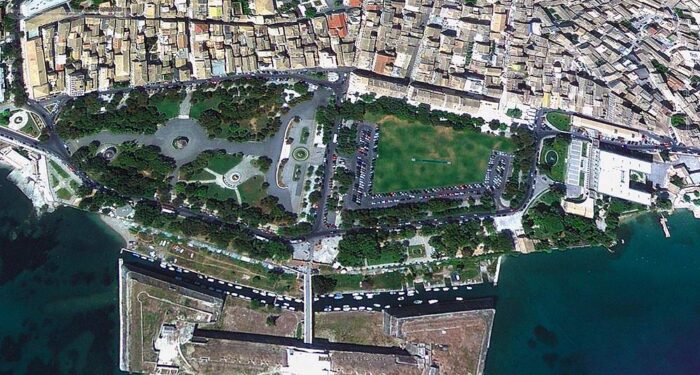
There is a huge long-lasting musical tradition on the island.
The city today has three main philharmonic societies. The Old Philharmonic, the Philharmonic of Mantzaros, and the Philharmonic of Kapodistrias, whose orchestras often give excellent concerts.
There are also bands in many villages, and on certain days they all play in Corfu Town to loud cheers from their supporters.
Italy influenced the musical tradition and many artists created their music schools with classical influences.
Is the so-called Ionian School of Music divided into two periods? The first until 1870 and the second until the early 20th century.
In Greece, the Ionian School was finally overthrown by the so-called National School, created by the “Germanists” Georgios Nazos and Manolis Kalomiris.
The Ionian School of Music
Greek-born Ionian musicians were the Corfiot George Lambellet and Cefalonian Dionysios Lavragas. Members of both the Ionian School and the “National School”.
They were in constant quarrels with “Germanist” Kalomiris who accused them of the Ionian music being related to the Italian.
The founder of the Ionian School of Music was Corfiot Nikolaos Chalikiopoulos Mantzaros(1795-1872).
Ionian school includes many important musicians and composers, of the first and second periods.
Corfiot and Ionian Islands Musicians
It is worth mentioning some musicians.
From Corfu
Domenikos Padovas (1817-1892), Spyros Xindas (1814-1896), and Spyros Samaras (1861-1917).
Eduardo, Louis, George, and Napoleon Lambellet are members of the large Lambellet family.
Other composers were Joseph Liveralis (1820-1899), Leonidas Alvanas (1823-1881), Joseph Caesaris (1845-1923), Spyridon Caesaris (1859-1946), Dimitrios Andronis (1866-1918), Sotirios Kritikos (1888-1945), and Alexandros Grek (1876-1959).
From Zante (Zakynthos)
Pavlos Karrer (1829-1896), Frangiskos Domeniginis (1809-1874), and Dionysios Viscardis (1910-1999).
Suzana Nerantzi from Zakynthos was a great woman pianist and student of Mantzaros in Corfu.
From Kefalonia
Dionysios Lavragas (1864-1941), Antiochos Evangelatos (1903-1981), and Spyridon Spathis (1876-1959) from Sami island.
From Ithaka
Dionysios Rodotheatos (1849-1892).
Others
Antonios Kapnisis (1813-1885), George Lambiris (1833-1889), Lavrentios Kamilieris (1878-1956), Georgios Axiotis (1875-1924), and Georgios Sklavos (1886-1976).
Literature

But also in literature, the Ionian Islands have created their own Ionian School.
With writers and poets such as the prominent figure of Dionysios Solomos from Zakynthos (1798-1857), who lived for 30 years in Corfu.
Many others such as Aristotelis Valaoritis from Lefkada, Andreas Laskaratos and Ioulios Typaldos from Lixouri, Gerasimos Markoras from Kefalonia, Iakovos Polylas from Corfu, Georgios Terchetis, and Andreas Kalvos from Zakynthos.
The term “Eptanissian School” was founded by the great Greek poet Kostis Palamas.
Kostis Palamas introduced the literary consciousness and the rivalry between the Dimotiki and Katharevousa. Two forms of the modern Greek language.
One of the main features of the Ionian School was the use of Dimotiki in Poetry.
Corfu’s contribution to the formation of the modern Greek state
The immense contribution of Corfiot intellectuals to the formation of the modern Greek state is well known.
The island has produced world-renowned personalities accomplished in many different spheres.
Corfu has given and still gives a lot in Greece, both culturally and economically through its huge tourist growth, but has not necessarily taken back all that it deserves!
Without mentioning the younger generations, the famous personalities who were born or lived here include:
Corfiot intellectuals
Ioannis Kapodistrias was a politician who, for several years, served as the Minister of Foreign Affairs of Russia. He was a descendant of a noble family.
From his position, he was involved in many European political affairs, including the constitutional reform of Switzerland, before accepting the responsibility of becoming the first governor of modern Greece.
Nikolaos Mantzaros was another noble, musician, and composer of the Greek national anthem. He was the major representative of the so-called Ionian School of Music.
Dionysios Solomos our national poet was born in Zakynthos(Zante) and lived here for the last 30 years of his life.
Spyros Samaras, another musician was the composer of the Olympic anthem. Yes, the one played during the opening and closing ceremonies of every Olympics.
The famous Italian composer Antonio Vivaldi lived much of his life on the island. As did poets like Gerasimos Markoras, Lorenzos Mavilis, Andreas Kalvos, and Iakovos Polylas.
All above were members of the Ionian School of Literature.
A former Greek prime minister was Corfiot George Theotokis, whilst his relative Nikolaos Theotokis became the archbishop of Russia.
The important Ecumenical Patriarch Athenagoras and St Filomena were born here.
The unforgettable actor Nikos Kourkoulos originates from Corfu. Also, Albert Cohen and the singers Vicky Leandros and Nana Mouskouri were born here.
There are hundreds of others not mentioned. Even Giacomo Casanova spent much of his life in Corfu and finally was forced to leave as he had an affair with the young wife of the Venetian proveditore.
Summary
Corfu boasts a rich musical tradition, with three renowned philharmonic societies that regularly perform. Influenced by Italian music, the island became the birthplace of the Ionian School of Music, founded by Nikolaos Mantzaros, and produced notable composers like Spyros Samaras, creator of the Olympic anthem.
Corfu’s literary scene also flourished, with figures like Dionysios Solomos, author of Greece’s national anthem, contributing to the Ionian School of Literature. This vibrant cultural history continues to shape Corfu’s identity today.
Read also:
Festivals and Panigiria in the Villages of Corfu
Experience authentic Corfiot culture at traditional village festivals (panigiria) with local food, music, and heartfelt celebrations year-round.
Gossip with a Twist: Corfu’s Petegoletsa Tradition
On the last Thursday of the carnival, Corfu has revived a very old tradition, an integral part of the Corfu carnival, which dates from the years of Venetian rule. It is called the Petegoletsa.
Corfu Carnival: Echoes of a Venetian Past
The Ancient celebrations in early spring that took place in honor of Dionysus, god of wine and fun, hoping for a good harvest and successful husbandry, are the forerunners of today’s carnival in Greece.
What is Corfu best known for?
Beyond its natural beauty, what is Corfu famous for? as a melting pot of various civilizations, is famous for its architecture, traditions, and cuisine.
Corfu Musical Tradition – Literature and Intellectuals
Corfu’s rich cultural heritage features a strong musical and literary traditions that continue to shape the island’s cultural identity until today.
Melodic Corfu: A Symphony of Culture, Music, and Beauty
Corfu, the musical heart of Greece, where the very air seems to harmonize with the soulful sounds of music when musical charm doesn’t stop at instruments and performances only.


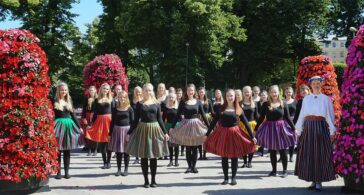
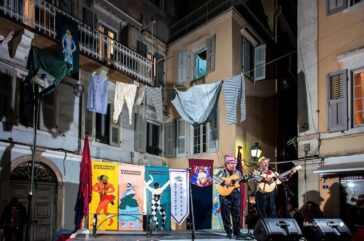
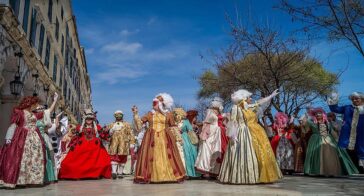
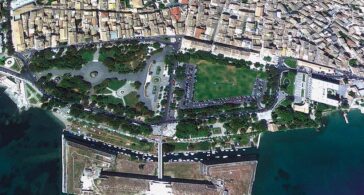



Comments